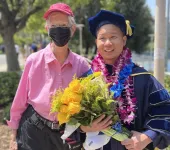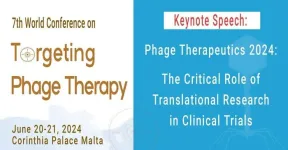(Press-News.org) RIVERSIDE, Calif. -- Vapers are susceptible to infection by SARS-CoV-2, the virus that spreads COVID-19 and continues to infect people around the world, a University of California, Riverside, study has found.
The liquid used in electronic cigarettes, called e-liquid, typically contains nicotine, propylene glycol, vegetable glycerin, and flavor chemicals. The researchers found propylene glycol/vegetable glycerin alone or along with nicotine enhanced COVID-19 infection through different mechanisms.
Study results appear in the American Journal of Physiology.
The researchers also found that the addition of benzoic acid to e-liquids prevents the infection caused by propylene glycol, vegetable glycerin, and nicotine.
“Users who vape aerosols produced from propylene glycol/vegetable glycerin alone or e-liquids with a neutral to basic pH are more likely to be infected by the virus, while users who vape aerosols made from e-liquids with benzoic acid — an acidic pH — will have the same viral susceptibility as individuals who do not vape,” said Rattapol Phandthong, a postdoctoral researcher in the Department of Molecular, Cell and Systems Biology and the research paper’s first author.
The researchers obtained airway stem cells from human donors to produce a 3D tissue model of human bronchial epithelium. They then exposed the tissues to JUUL and BLU electronic cigarette aerosols to study the effect on SARS-CoV-2 infection. They found all tissues showed an increase in the amount of ACE2, a host cell receptor for the SARS-CoV-2 virus. Further, TMPRSS2, an enzyme essential for the virus to infect cells, was found to show increased activity in tissues exposed to aerosols with nicotine.
Prue Talbot, a professor of the graduate division and Phandthong’s advisor, said e-cigarette users should be cautious about vaping as some products will increase their susceptibility to SARs-CoV-2 infection.
“It would probably be best for vapers to quit vaping for the protection of their health and to stop nicotine dependency,” she said. “If they cannot stop vaping, it is better to vape aerosols produced from an e-liquid with acidic pH or with benzoic acid to prevent the enhanced SARS-CoV-2 infection caused by nicotine, propylene glycol, and vegetable glycerin. However, inhalation of benzoic acid has its own risk, and data is still limited on this topic.”
The researchers acknowledge that the relationship between e-cigarettes and SARS-CoV-2 susceptibility is complex.
“The complexity is attributed to a wide range of available e-liquids, the chemical composition of each e-liquid, and different models of e-cigarettes,” Phandthong said. “Our study only used Classic Tobacco Flavor JUUL e-cigarette and BLU Classic Tobacco e-cigarette. Even with just these two e-cigarettes, we found the aerosols and individual ingredients produced different effects on SARS-CoV-2 infection.”
Phandthong and Talbot hope the Food and Drug Administration will use their findings to implement regulatory laws on e-cigarette products.
“Our findings could also help improve the design of clinical trials involving the use of tobacco products and SARS-CoV-2 infection,” Phandthong said. “In the meantime, it is worth bearing in mind that the scientific literature has shown that a vaper who contracted SARS-CoV-2 has more complications during the recovery period and is more likely to develop long COVID-19, which can be serious and last many months post-infection. We hope our findings encourage vapers to stop vaping and discourage non-users from starting to vape.”
Phandthong acknowledged the team only investigated the initial stage of SARS-CoV-2 infection.
“There are many later stages involved in infection, such as viral replication,” he said. “It is likely that these additional stages can also be affected by inhalation of e-cigarette aerosols.”
Phandthong and Talbot were joined in the study by Man Wong, Ann Song, and Teresa Martinez.
The research was funded by grants from the Tobacco-Related Disease Research Program, National Institute of Environmental Health Sciences, Center for Tobacco Products of the Food and Drug Administration, and California Institute of Regenerative Medicine.
The research paper is titled “Does vaping increase the likelihood of SARS-CoV-2 infection? Paradoxically yes and no.”
The University of California, Riverside is a doctoral research university, a living laboratory for groundbreaking exploration of issues critical to Inland Southern California, the state and communities around the world. Reflecting California's diverse culture, UCR's enrollment is more than 26,000 students. The campus opened a medical school in 2013 and has reached the heart of the Coachella Valley by way of the UCR Palm Desert Center. The campus has an annual impact of more than $2.7 billion on the U.S. economy. To learn more, visit www.ucr.edu.
END
Vaping can increase susceptibility to infection by SARS-CoV-2
UC Riverside study urges e-cigarette users to be cautious about vaping in the era of COVID-19
2024-02-26
ELSE PRESS RELEASES FROM THIS DATE:
Dissecting the roles for excitatory and inhibitory neurons in STXBP1 encephalopathy
2024-02-26
A recent study from Baylor College of Medicine and Texas Children’s Hospital has discovered inhibitory and excitatory neurons play distinct roles in the pathogenesis of STXBP1 encephalopathy, one of the top five causes of pediatric epilepsies and among the most frequent causes of neurodevelopmental disorders. This early-onset disorder is caused by spontaneous mutations in the syntaxin-binding protein 1 (STXBP1) gene. While STXBP1 gene variants impair both excitatory and inhibitory neurotransmission, this study led by Dr. Mingshan Xue, associate professor at Baylor and principal investigator at the Jan and Dan Duncan Neurological Research Institute (Duncan ...
Boston College biologist awarded $2.5-million NIH grant to explore the role of viral insulins and potential applications to cancers
2024-02-26
Chestnut Hill, Mass (2/26/2024) – Boston College Assistant Professor of Biology Emrah Altindis has been awarded a five-year, $2.5-million grant from the National Institutes of Health to study viral insulins and mechanisms related to IGF-1 receptor protein inhibition and its potential applications in cancer treatment.
Altindis said he and the researchers in his lab will use the grant to learn more about how to use specific viral insulins – particularly insulin-like growth factor-1 (IGF-1) – to inhibit IGF-1 receptor action, which is increased in a range ...
New clinical practice guideline provides evidence-based recommendations for immunotherapy for inhalant allergy
2024-02-26
ALEXANDRIA, VA —The American Academy of Otolaryngology–Head and Neck Surgery Foundation published the Clinical Practice Guideline: Immunotherapy for Inhalant Allergy today in Otolaryngology–Head and Neck Surgery. This clinical practice guideline identifies quality improvement opportunities and provides clinicians trustworthy, evidence-based recommendations on the management of inhalant allergies with immunotherapy, supporting them to provide enhanced care to patients aged 5 years and older who are experiencing symptoms from inhalant allergies.
“More ...
SFU-led research team designs a cutting-edge protein lawnmower
2024-02-26
An SFU-led collaboration has designed the first synthetic protein-based motor which harnesses biological reactions to fuel and propel itself.
“Imagine if a Roomba could be powered only by the dirt it picks up,” says SFU Physics professor Nancy Forde, one of the authors of the study.
The team’s paper, led by SFU Physics PhD graduate Chapin Korosec and published today in Nature Communications, describes a protein-based molecular motor called “The Lawnmower,” which has been designed to cut a lawn of peptide “grass.” ...
Metal in glitter impairs aquatic plant growth, study shows
2024-02-26
Glitter is used in a wide array of colors and shapes in apparel, footwear, cosmetics, makeup, handbags, festive decorations, arts and crafts, and jewelry, among many other applications. During the Carnival holidays, hundreds of thousands of Brazilians cover parts of their bodies with it while dancing in the streets. Its brilliance is dazzling but it is considered an emerging pollutant by many scientists: like other microplastics (small plastic pieces less than 5 mm long), it is not filtered by wastewater treatment plants and ends up in rivers and the sea, interfering with aquatic life in various ways.
A study conducted at the Federal University of ...
Scientists assemble a richer picture of the plight and resilience of the foothill yellow-legged frog
2024-02-26
(Santa Barbara, Calif.) — Up to only a few inches in length, with a lemon-hued belly, the foothill yellow-legged frog may seem unassuming. But its range once stretched from central Oregon to Baja California. In 2023, it was listed under the federal Endangered Species Act. Its rapidly decreasing range is due in part to a fungal pathogen called Batrachochytrium dendrobatidis, or Bd, that has devastated amphibians around the world.
A team of researchers, including UC Santa Barbara’s Andrea Adams, has conducted the most comprehensive study to date ...
Neuropsychiatric symptoms predict which patients with mild cognitive impairment develop Alzheimer’s disease.
2024-02-26
As the years add up, it's common to notice slight changes in our ability to remember and think. Older people who have more marked changes than their peers can be diagnosed with mild cognitive impairment (MCI). Currently, we can’t easily predict which of these patients will develop Alzheimer’s disease and which will not.
“It's hard to predict which patients will have a more rapid progression and receive a diagnosis of dementia,” said Maria Vittoria Spampinato, M.D., division director of Neuroradiology at the Medical University of South Carolina.
“It’s important ...
Resurrecting niobium for quantum science
2024-02-26
For years, niobium was considered an underperformer when it came to superconducting qubits. Now scientists supported by Q-NEXT have found a way to engineer a high-performing niobium-based qubit and so take advantage of niobium’s superior qualities.
When it comes to quantum technology, niobium is making a comeback.
For the past 15 years, niobium has been sitting on the bench after experiencing a few mediocre at-bats as a core qubit material.
Qubits are the fundamental components of quantum devices. One qubit type relies on superconductivity to process information.
Touted for its superior qualities as a superconductor, niobium was always a promising ...
Long-term data reveals SARS-CoV-2 infection and vaccine-induced antibody responses are long-lasting
2024-02-26
A long-term analysis conducted by leading microbiologists at the Icahn School of Medicine at Mount Sinai reveals that antibody responses induced by COVID-19 vaccines are long-lasting. The study results, published online in the journal Immunity on February 22, challenge the idea that mRNA-based vaccine immunity wanes quickly.
The emergence of SARS-CoV-2, the virus that causes COVID-19, in late 2019 sparked the global pandemic that is now in its fifth year. Vaccines that were developed at record speed have saved millions of lives. However, the emergence of SARS-CoV-2 variants and waning immunity have decreased ...
Shaping the future of phage therapy: The 7th World Conference on Targeting Phage Therapy in Malta aims to transform clinical trials through translational research
2024-02-26
The 7th World Conference on Targeting Phage Therapy 2024, two-day event dedicated to advancing the field of phage research and therapy will be hosted at Corinthia Palace Malta on June 20-21.
Robert T. Schooley, M.D., Professor of Medicine at the University of California, San Diego, Co-Director of the Center for Innovative Phage Applications and Therapeutics, and member of the Executive Committee for the University of California Disaster Resilience Network, will introduce the messages and strategies behind phages therapy 2024.
His talk titled “Phage Therapeutics 2024: Essential Translational Research Components for ...
LAST 30 PRESS RELEASES:
Learning makes brain cells work together, not apart
Engineers improve infrared devices using century-old materials
Physicists mathematically create the first ‘ideal glass’
Microbe exposure may not protect against developing allergic disease
Forest damage in Europe to rise by around 20% by 2100 even if warming is limited to 2°C
Rapid population growth helped koala’s recovery from severe genetic bottleneck
CAR-expressing astrocytes target and clear amyloid-β in mouse model of Alzheimer’s disease
Unique Rubisco subunit boosts carbon assimilation in land plants
Climate change will drive increasing forest disturbances across Europe throughout the next century
Enhanced brain cells clear away dementia-related proteins
This odd little plant could help turbocharge crop yields
Flipped chromosomal segments drive natural selection
Whole-genome study of koalas transforms how we understand genetic risk in endangered species
Worcester Polytechnic Institute identifies new tool for predicting Alzheimer’s disease
HSS studies highlight advantages of osseointegration for people with an amputation
Buck Institute launches Healthspan Horizons to turn long-term health data into Actionable healthspan insights
University of Ottawa Heart Institute, the University of Ottawa and McGill University launch ARCHIMEDES to advance health research in Canada
The world’s largest brain research prize awarded for groundbreaking discoveries on how we sense touch and pain
Magnetofluids help to overcome challenges in left atrial appendage occlusion
Brain-clearing cells offer clues to slowing Alzheimer’s disease progression
mRNA therapy restores fertility in genetically infertile mice
Cloaked stem cells evade immune rejection in mice, pointing to a potential universal donor cell line
Growth in telemedicine has not improved mental health care access in rural areas, study finds
Pitt scientists engineer “living eye drop” to support corneal healing
Outcomes of older adults with advanced cancer who prefer quality of life vs prolonging survival
Lower music volume levels in fitness class and perceived exercise intensity
Of crocodiles, counting and conferences
AERA announces 2026 award winners in education research
Saving two lives with one fruit drop
Photonic chips advance real-time learning in spiking neural systems
[Press-News.org] Vaping can increase susceptibility to infection by SARS-CoV-2UC Riverside study urges e-cigarette users to be cautious about vaping in the era of COVID-19






